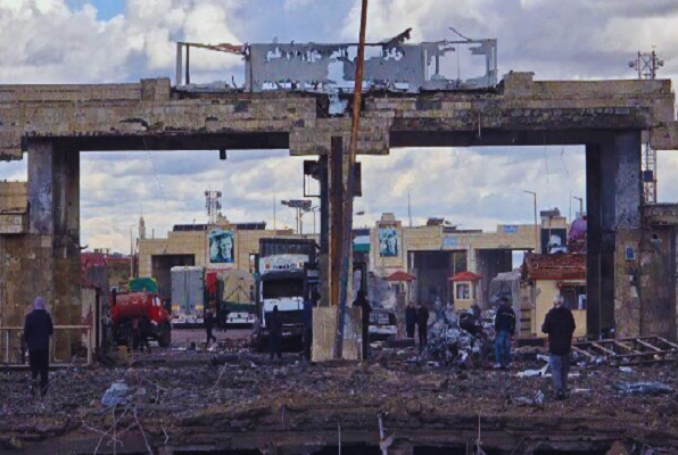
These crossings serve as major entry points to Syria’s Homs province, a region marked by ongoing clashes between forces loyal to Bashar al-Assad’s government and armed Syrian militants.
The official Syrian news agency (SANA) reported that the Arida border crossing between Syria and Lebanon was rendered inoperable early Friday morning following Israeli airstrikes targeting the bridge and surrounding infrastructure in the border region.
The attack caused extensive damage to the bridge connecting the Lebanese and Syrian sides and inflicted harm on several facilities at the crossing, effectively severing the vital road linking the two countries.
Lebanese Transport Minister Ali Hamieh confirmed to the Reuters news agency that Israeli strikes targeted two border crossings: the Arida crossing in northern Lebanon and the Jose crossing in eastern Lebanon.
Hamieh stated that the attacks caused significant damage to the infrastructure at both locations, forcing the suspension of all traffic through these key routes.
#IDF airstrikes destroyed the Al Arida and Jousieh border crossings between northern #Lebanon and #Syria. The Joussieh crossing served as a vital link between Hezbollah-dominated northern #Bekaa in Lebanon and the #Hezbollah-controlled Syrian town of Al Qusayr near #Homs. pic.twitter.com/50e59zlvaz
— War_Room_ME (@WarRoomME) December 6, 2024
These crossings serve as major entry points to Syria’s Homs province, a region marked by ongoing clashes between forces loyal to Bashar al-Assad’s government and armed Syrian militants. Their strategic importance adds further weight to the impact of these attacks amid the ongoing conflict.
According to Lebanon’s National News Agency, the raid on the Arida Crossing destroyed large portions of the bridge and severely damaged facilities, while the Jose Crossing experienced similar destruction.
In recent weeks, these crossings have been closed multiple times due to Israeli strikes, causing repeated disruptions in transportation between the two nations.
Israeli military spokesperson Avichay Adraee stated that the dawn raids targeted infrastructure and facilities used to transport weapons near the Lebanese-Syrian border.
He added that the strikes were part of ongoing efforts to weaken ‘Unit 4400,’ a group he claimed is responsible for arming Hezbollah and transporting weapons, posing a “threat to Israel’s security.”
Arida border crossing between #Syria and #Lebanon is out of service due to an #Israeli aggression that targeted it on Friday dawn. https://t.co/ojvLNNOp4v pic.twitter.com/RRGhxoaKd4
— SANAEnglishOfficial (@SANAEnOfficial) December 6, 2024
The Arida crossing had already suffered significant damage during previous conflicts, particularly during the last war on Lebanon, when Israeli airstrikes completely destroyed the bridge.
After extensive rehabilitation efforts restored the bridge for public use, Israeli airstrikes have again rendered it unusable, once more cutting off access between Lebanon and Syria.
These attacks come amid a fragile ceasefire agreement, which has seen approximately 141 violations by the Israeli military since it took effect on November 27. These violations include artillery fire, airstrikes, drone and warplane activity, as well as ground incursions and machine gun fire along the border.
In retaliation for the recent Israeli strikes, Hezbollah launched a missile attack on the Ruwaysat al-Alam area in the occupied Lebanese Kfar Shuba hills—the first such action since the ceasefire agreement began.
Since the start of Israel’s aggression on Lebanon in September, more than 4,047 people have been killed, 16,643 injured—most of them women and children—and approximately 1.4 million people have been displaced, primarily from Lebanon’s southern and northern regions.
(PC, AJA)
